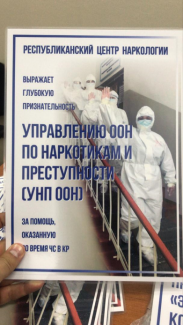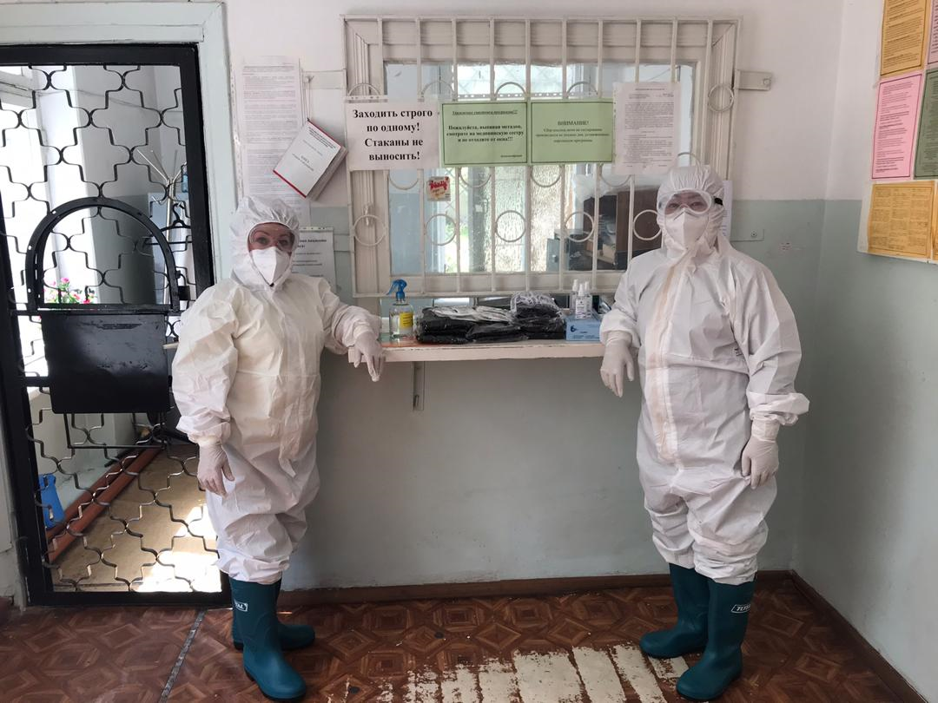UNODC and partners support the Republican Narcotics Center in the fight against COVID-19 in Kyrgyzstan

Although COVID-19 usually occurs easily and most people recover quickly, coronavirus can cause very serious complications for certain categories of people, including the elderly and people with weakened immune systems or chronic diseases. Ensuring continued access to health care during a pandemic, including services for people using drugs and the treatment of drug-related disorders, is essential not only for public health, but also a key element in security and stability.
Every day, Kyrgyzstan reports an increasing number of people infected with COVID-19. This increase has been observed since September 1, when the number of people infected was 60, until October 30, 2020, when this number increased to more than 500 cases per day.
In response to the second wave of the pandemic in the country and in light of the United Nations call for a COVID-19 response, the United Nations Office on Drugs and Crime (UNODC) in the Kyrgyz Republic, along with UNODC headquarters, the Regional Mission in Central Asia and the Unaids Country Development Fund, supported the UnCRIN Center for Drugs (RCT) with individual protections totaling $100 million.
"Given the rapid unexpected increase in the spread of the infection in July, we decided not to wait until it became too obvious that hospitals were overcrowded with patients, and we reorganized our facilities to 200 beds to accept and treat the people who contracted COVID-19," said Ruslan Tokobayev, head of the Kyrgyz Republic's Republican Narcotics Center.
"It is important to ensure that adequate access to health and social services is uninterrupted for people using medicines, as well as the continuity of care provided in accordance with the International Standards for the Treatment of Drug Use Disorders (UNODC/WHO, 2020), especially in times of crisis. This includes low-threshold services and psychosocial and pharmacological treatment in a variety of environments," said Andrei Seleznev, Head of UNODC's Program office in the Kyrgyz Republic. He added: "Individual protection: face masks, gloves, chemical protective suits, rubber boots and disinfectants are already being worn by RNC staff and will hopefully provide good protection in the second wave of the COVID-19 pandemic."
According to the report "A Brief Review of the Impact of COVID-19 on drug use as well as on drug reduction and harm services in Central Asia" prepared by unodc's Regional Office in Central Asia, the COVID-19 pandemic has had a significant impact on economic development, lifestyle and health in all countries in the Central Asia region. It also affected the work of drug reduction and harm programs. As shown, drug users are the last to consider safety in relation to COVID-19 and often have no means and motivation to purchase personal protective equipment. In this case, the issue of providing this category of population with personal protection and information materials is relevant for many countries. Some countries have observed the need for personal protective equipment, as well as coVID-19 awareness and training programs, including for health workers.

Support was provided under the Sub-3 Program "Prevention and Treatment of Drug Addiction, Reintegration of Drug Addicts and HIV Prevention" by UNODC For Central Asian States 2015-2020 and the UNODC GLOK32 Global Project "Joint UNODC and WHO Program for Drug Treatment and Follow-up".
